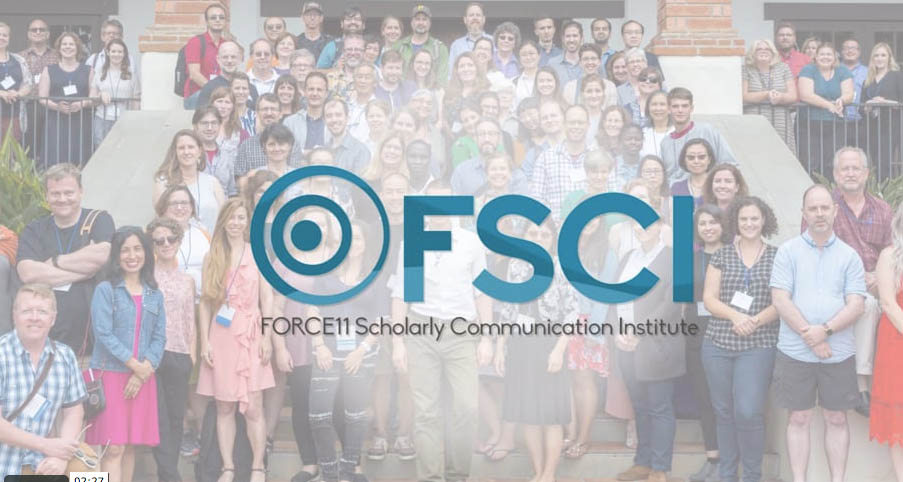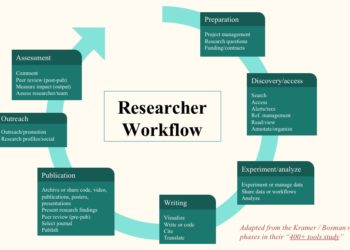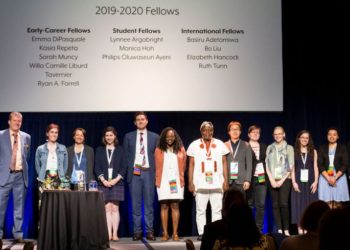Editor’s note: This guest post is authored by Fiona Murphy, Nicky Agate, Amy Price, and Stephanie Hagstrom, members of the Steering Committee for FSCI, a training and educational week taking place this year at the University of California, Los Angeles on August 5-9.
Today’s research knowledge can be harvested and data analyzed faster than has been possible in all previous generations combined. As a result, Open Research practices and outputs face a number of tensions between initial intentions and unforeseen consequences. For example, the FAIR Data Principles propose that research data should be Findable, Accessible, Interoperable, and Reusable — but nothing has prepared us for the use and misuse of personal data. Even if they start out ethically approved and safe in the researcher’s toolkit, they can later be sold to a third party in exchange for analytical services, enabling machines to identify disease states from a picture, classify your intelligence and demographic profile in four “likes” or less, or traffic organs and direct market to those that need them on social media.

And so our questions about Open Research are also changing — from “why” to “how” — amidst growing awareness that the required skill sets, both technical and social, are not yet part of the standard training programs for researchers. Consider, for example, the questions and challenges that early career researchers face as they critique a distinguished professor’s work while conducting an open peer review. How do they balance the need for research integrity and rigorous review without career-ending consequences? How do we protect reviewers who review in good faith only to be raked through the coals on social media, while the perpetrators are funded and their work is published.
So, if you actually want to practice Open Research, how do you learn about it? How do you balance effort with effect? How do you discover and validate the standards that are being adopted by your communities?
Luckily, there are many opportunities to learn about Open Research practices at events and workshops, often held in conjunction with scholarly conferences or via webinar, as well as several one-off and ad-hoc courses at conferences or online, including:
- The recently merged Software, Data, and Library Carpentry movements, now collectively known as The Carpentries – a non-profit that trains and supports researchers in data and computational skills for conducting efficient, open, and reproducible research with an emphasis on enabling skills to be embedded in research institutions
- Triangle SCI – an annual think tank that provides a week-long workshop to address issues in scholarly communication around specific themes
- ACRL ScholComm Roadshow – a one-day workshop that equips librarians with knowledge and skills to help accelerate the transformation of the scholarly communication system
- The new Open Science MOOC – a volunteer organization that recently released its first module: Open Research Software and Open Source (a further nine are proposed)
- CODATA-RDA School of Research Data Science – over two weeks, this provides Early Career Researchers and Professionals with the necessary set of foundational Data Science skills to enable them to analyze their data in an efficient and effective manner for the 21st century
- European Commission-funded FOSTER training portal – hosts 1-2 hour online courses that answer some of the most common questions about putting open science into practice
- FORCE11 Scholarly Communications Institute (FSCI) – more about that later
However, there remain some critical issues, including:
- Scale: there are approximately 10 million researchers working globally, but face-to-face training opportunities reach only a few thousand researchers per year. Webinars and MOOCs have the potential to reach more, but even they are limited in how many individuals they can hope to reach
- Engagement: even where Open Research training sessions are provided, it can be difficult to persuade researchers to attend without clear incentives for doing so
- Relevance: it is challenging to provide Open Research training that is sufficiently relevant for researchers working within a specific field. Although there are many commonalities across disciplines, there are also many real differences. As well as the challenge of balancing domain-neutral vs domain-specific activities, those working in social sciences and the humanities can feel alienated by terminology and assumptions that originated with the sciences
- Coherence: while Open Research practices certainly need to be underpinned by investment in training, they also require a change in evaluation systems, funder policies, and many aspects of research culture. Without providing support across this spectrum, the overall pace of change will inevitably be slowed
- Lack of validation: in order to build trust and uptake (and usability), the research communities themselves need to be involved in shaping Open Research practices and standards, and in providing appropriate, reasonably priced training
One of the organizations that is seeking to address these challenges — across disciplines and domains — is the Force 11 Scholarly Communications Institute. Our mission is to train this generation in trustworthy behaviors coupled with scholarly prowess, and our former students, such as Adegbilero-Iwari Idowu, are emerging as leaders who are changing the scholarly communications culture and bringing learning to their institutions. FSCI is now in its third year and focuses on offering deep dive courses and mentoring so that, no matter where attendees are from, they can leave with the skills to implement what they have learned. This year, we are offering courses on Plan S, FAIR Data, reproducibility, culture change, and digital humanities, among others. The focus is practical: for example, participants learn that, while there are few 100% Open Data researchers, inexpensive alternatives can help increase access to data for everyone through easier data-sharing and automation of the uploading process directly from ORCID and other platforms.
A conference can inspire, but training is what enables us to move beyond brainstorming and recognition of new technology to practical implementation. The efforts of FSCI and other organizations that are providing this kind of support do contribute to the overall pace of change. However, there is still a need for more holistic thinking on the part of funders and policy makers, as well as for research communities themselves to engage more actively so that the course offerings can be shaped around specific domain requirements. We recognize these are not easy transformations to effect and would be delighted to pick up this discussion with Scholarly Kitchen readers.
Discussion
3 Thoughts on "Guest Post — Open Research in Practice: Moving from Why to How?"
Trustworthy behaviors and interesting comment regarding the allowing of third parties to access and use data as described in the opening scenario!
Great to read this from the members of the steering committee of FSCI. This brieg but informative post provides intending participants of what to expect during the scholarly communication week. Interestingly, as a recipient of FSCI scholarship, I will be taking a course on R and Dataverse at UCLA August 5-9. I’m so looking forward to it. Thanks for sharing your thoughts on open research practices. Very apt.



